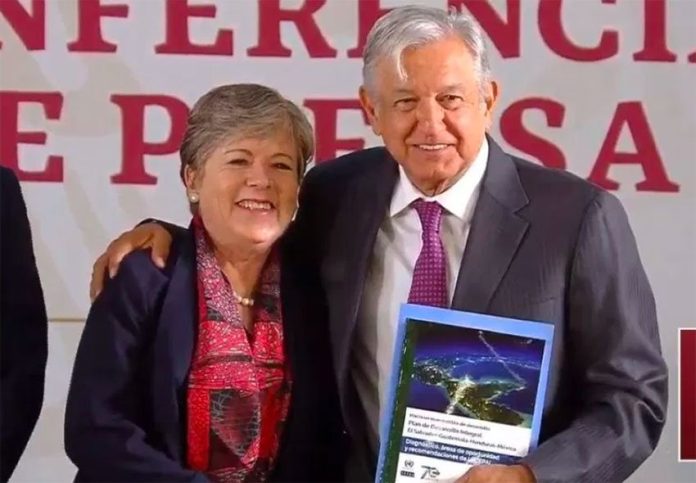The federal government and the United Nations today presented a regional development plan designed to improve economic and social conditions in southern Mexico and Central America and stem migration to the United States.
Foreign Affairs Secretary Marcelo Ebrard and Alicia Bárcena, executive secretary of the UN Economic Commission for Latin America and the Caribbean (ECLAC), offered details about the Comprehensive Development Plan at this morning’s presidential press conference.
“This is a roadmap of what we have to do to change the reality in the south of Mexico, Guatemala, Honduras and El Salvador,” Ebrard said.
The foreign secretary said that ECLAC drew up the plan in “record time” with the collaboration of Mexico and the three Central American countries. Its implementation “is a priority for this government,” Ebrard added.
The plan aims to address unemployment and violence in the region, which are the primary causes of migration.
Tens of thousands of people from Guatemala, Honduras and El Salvador have fled their countries in recent months to escape poverty and violence. Many are stranded in Mexico’s northern border cities while they await the opportunity to claim asylum in the United States.
Bárcena said the development plan is based on four core elements all of which are intended to guarantee human security: economic development, social well-being, environmental sustainability and comprehensive management of the migratory cycle.
She described the region of Central America known as the Northern Triangle as “more violent than the Middle East.”
A US $300-million regional electrical interconnection project, a 600-kilometer gas pipeline and a highway linking Guatemala to Tenosique, Tabasco, are among the initiatives proposed to generate employment.
Greater education opportunities including job training as well as initiatives to reduce corruption and increase salaries in Central American countries are also part of the plan’s agenda.
In addition, Bárcena said that ECLAC and the plan’s signatory countries will seek to have the cost of sending remittances to Mexico and Central American countries reduced so that migrants already in the United States are in a better position to support their family members back home.
“It’s extremely expensive for them to send their money . . . We’re going to help them so it’s cheaper and so that [their family members] can start businesses . . .” she said.
President López Obrador said he has asked Ebrard to seek agreements from the United States, Canada and other countries to support the development plan.
The United States committed in December to an investment of US $10.6 billion: $5.8 billion to the Northern Triangle (Guatemala, Honduras, El Salvador) of Central America and $4.8 billion to Mexico.
However, most of the U.S. funding was not new as it will be allocated from existing aid programs.
Earlier this month, López Obrador said that he wanted to end the Mexico-United States security cooperation agreement known as the Mérida Initiative.
He proposed that Mérida funds be directed instead to development and job creation in Mexico’s southeast and Central American nations.
“We don’t want armed helicopters. We don’t want resources for other kinds of military support, what we want is production and work. We’re seeking cooperation for development, not for the military, not for the use of force.”
Source: El Financiero (sp), Milenio (sp)
